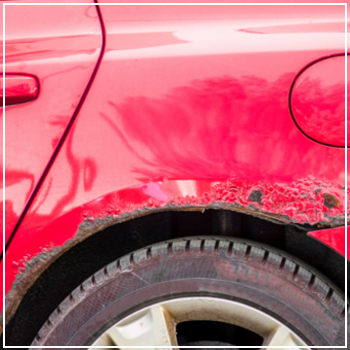Rust is the result of a chemical process called oxidation, which happens when metal reacts with water and oxygen. Salt can speed up this reaction, making coastal areas and winter roads particularly dangerous for vehicles. If your car is parked outside or driven in harsh weather conditions, it's more likely to develop rust over time. A small spot of rust may seem harmless at first, but it can quickly spread under the paint, causing bubbles, peeling, or flaking. Even a tiny scratch can lead to rust if left untreated, especially if your car is often exposed to rain or moisture. That’s why it’s important to take action early and protect your vehicle from the start. One of the best ways to prevent rust is to apply a protective layer before any damage occurs. This can include: These methods help keep water and debris from reaching the metal underneath, reducing the risk of rust forming in the first place. Winter driving means more exposure to road salt, which is one of the biggest culprits behind rust. Make sure to wash your car regularly, especially after driving on salted roads. If you live near the coast, even more attention is needed—salt, bird droppings, and tree sap can all contribute to corrosion. Regular washing not only removes harmful substances but also helps maintain your car’s appearance and protects its paint job, which is essential in preventing rust. During fall, drain plugs can become clogged with leaves, dirt, and moisture. This buildup can cause rust and damage the paint. Check around the edges of your hood, trunk, and doors to make sure they’re clean and free of debris. Spilled drinks or liquids inside your car can seep into the carpet and under the upholstery, creating a moist environment where rust can form. Always wipe up spills immediately and dry the area thoroughly. If possible, remove the carpet and let it air out outside. If not, leave the doors open in a garage to help it dry faster. Early detection is key to stopping rust before it spreads. Look for:
If you live in a cold, wet, or coastal area, consider storing your car in a garage or enclosed carport. This reduces exposure to moisture and salt, two major causes of rust. A dry, sheltered space can go a long way in protecting your vehicle. As winter approaches, it’s a great time to schedule a professional inspection or rustproofing treatment. Contact DaSilva’s Auto Body today to ensure your car stays protected and in top condition. Don’t wait until it’s too late—take proactive steps now to keep your car looking and performing its best for years to come.
Forged round bar
Forged shaft
Forged alloy steel bar
Forged carbon steel bar
steel bar, round bar, forged bar, forged steel bar, forged round bar Changzhou Chengxin Metal Products Co., Ltd , https://www.chengxinsteeltube.com There’s nothing more frustrating than discovering early signs of rust on your car. While some wear and tear is inevitable, unexpected rust after just a few years can be alarming. The good news is that many causes of rust are preventable. Here’s what you need to know about why cars rust and how to stop it before it starts.
There’s nothing more frustrating than discovering early signs of rust on your car. While some wear and tear is inevitable, unexpected rust after just a few years can be alarming. The good news is that many causes of rust are preventable. Here’s what you need to know about why cars rust and how to stop it before it starts.How Rust Actually Forms
1. Apply Rustproofing Before It’s Too Late
2. Keep Your Car Clean All Year Round
3. Don’t Overlook the Drain Plugs
4. Act Fast on Interior Spills
5. Inspect for Early Signs of Rust
If you notice any of these signs, address them right away to avoid costly repairs later.
6. Store Your Car Safely